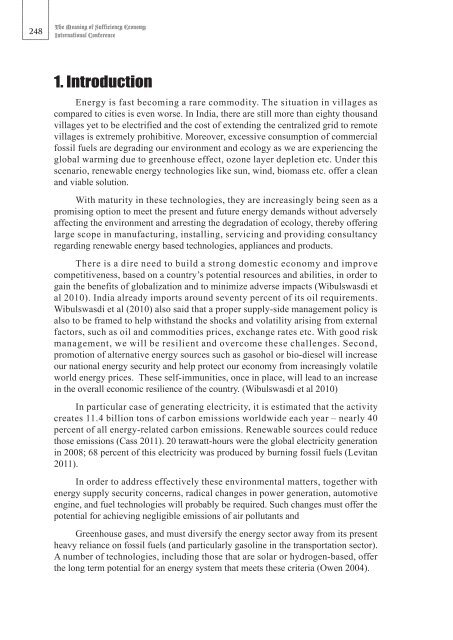SUFFiciENcy EcONOMy ANd GRASSROOtS DEvElOPMENt
SUFFiciENcy EcONOMy ANd GRASSROOtS DEvElOPMENt
SUFFiciENcy EcONOMy ANd GRASSROOtS DEvElOPMENt
You also want an ePaper? Increase the reach of your titles
YUMPU automatically turns print PDFs into web optimized ePapers that Google loves.
248<br />
The Meaning of Sufficiency Economy <br />
International Conference<br />
1. Introduction <br />
Energy is fast becoming a rare commodity. The situation in villages as<br />
compared to cities is even worse. In India, there are still more than eighty thousand<br />
villages yet to be electrified and the cost of extending the centralized grid to remote<br />
villages is extremely prohibitive. Moreover, excessive consumption of commercial<br />
fossil fuels are degrading our environment and ecology as we are experiencing the<br />
global warming due to greenhouse effect, ozone layer depletion etc. Under this<br />
scenario, renewable energy technologies like sun, wind, biomass etc. offer a clean<br />
and viable solution. <br />
With maturity in these technologies, they are increasingly being seen as a<br />
promising option to meet the present and future energy demands without adversely<br />
affecting the environment and arresting the degradation of ecology, thereby offering<br />
large scope in manufacturing, installing, servicing and providing consultancy<br />
regarding renewable energy based technologies, appliances and products.<br />
There is a dire need to build a strong domestic economy and improve<br />
competitiveness, based on a country’s potential resources and abilities, in order to<br />
gain the benefits of globalization and to minimize adverse impacts (Wibulswasdi et<br />
al 2010). India already imports around seventy percent of its oil requirements.<br />
Wibulswasdi et al (2010) also said that a proper supply-side management policy is<br />
also to be framed to help withstand the shocks and volatility arising from external<br />
factors, such as oil and commodities prices, exchange rates etc. With good risk<br />
management, we will be resilient and overcome these challenges. Second,<br />
promotion of alternative energy sources such as gasohol or bio-diesel will increase<br />
our national energy security and help protect our economy from increasingly volatile<br />
world energy prices. These self-immunities, once in place, will lead to an increase<br />
in the overall economic resilience of the country. (Wibulswasdi et al 2010)<br />
In particular case of generating electricity, it is estimated that the activity<br />
creates 11.4 billion tons of carbon emissions worldwide each year – nearly 40<br />
percent of all energy-related carbon emissions. Renewable sources could reduce<br />
those emissions (Cass 2011). 20 terawatt-hours were the global electricity generation<br />
in 2008; 68 percent of this electricity was produced by burning fossil fuels (Levitan<br />
2011).<br />
In order to address effectively these environmental matters, together with<br />
energy supply security concerns, radical changes in power generation, automotive<br />
engine, and fuel technologies will probably be required. Such changes must offer the<br />
potential for achieving negligible emissions of air pollutants and<br />
Greenhouse gases, and must diversify the energy sector away from its present<br />
heavy reliance on fossil fuels (and particularly gasoline in the transportation sector).<br />
A number of technologies, including those that are solar or hydrogen-based, offer<br />
the long term potential for an energy system that meets these criteria (Owen 2004).














